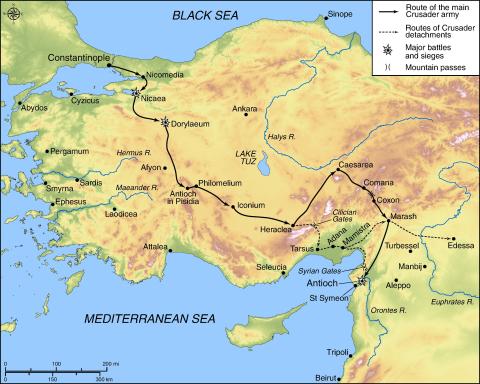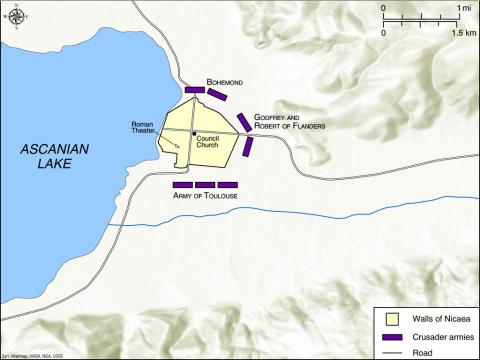The Siege of Nicaea
[2.7.1] Tancredus vērō et Richardus dē Prīncipātū propter iūsiūrandum imperātōris latenter trānsfretāvērunt Brācchium, et ferē omnis gēns Boamundī iuxtā illōs. Et mox exercitus comitis Sānctī Egidīī appropinquāvit Cōnstantīnopolī. Comes vērō remānsit ibi cum ipsā suā gente. Boamundus itaque remānsit cum imperātōre, ut cum eō cōnsilium acciperet, quōmodo mandārent mercātum gentibus quae erant ultrā Nicēnam cīvitātem. Dux itaque Godefridus īvit prius Nīcomēdīam simul cum Tancrēdō et aliīs omnibus, fuēruntque ibi per trēs diēs. Vidēns vērō dux quod nūlla via patēret per quam posset condūcere hās gentēs usque Nicēnam cīvitātem, quoniam per illam viam per quam prius aliī trānsierant nōn posset modo tanta gēns trānsīre, mīsit ante sē tria mīlia hominum cum secūribus et gladiīs, quī incīdissent et aperuissent hanc viam, quae patefacta fieret nostrīs peregrīnīs usque Nicēnam urbem. Quae via fuit aperta per angustam et nimis immēnsam montānam, et faciēbant retrō per viam crucēs ferreās ac ligneās, quās pōnēbant super stīpitēs, ut eās nostrī peregrīnī cognōscerent.
notes
(April 1097) Tancred and Richard of the Principality avoid swearing loyalty to Alexius and lead Bohemond’s men across the Hellespont. Godfrey of Bouillon leaves Constantinople to join them. The crusaders begin clearing a path to Nicaea.
propter iūsiūrandum imperātōris: “because of the emperor’s oath”; they wanted to avoid taking it.
quōmodo mandārent mercātum: the subject is presumably the emperor and Bohemond, or else the emperor and his advisors.
gentibus quae erant ultrā Nicēnam cīvitātem: I wonder if, as at 1.2.3 the author didn’t write (or should have written) ultra Nicomediam. We are not otherwise told that crusaders had gone beyond Nicaea.
per illam viam per quam prius aliī trānsierant: the road taken by the People’s Crusade, from Nicomedia towards Nicaea (above, 1.2.3).
nōn posset modo tanta gēns trānsīre: “such a large (group of) people could not now travel on it.”
montānam: now called the Katirli Dagi.
vocabulary
propter: (prep. + acc.) because of; to avoid
fēre: approximately, almost
iuxtā: (prep. + acc.) along with (see OLD 4)
mandō (1): to deliver (OLD 1)
prius: before
modo: now; recently; just
secūris –is, f.: ax
nimis: very, exceedingly (OLD 1 and 3)
retrō: behind (OLD 2a)
angustus –a –um: narrow (CL); steep and narrow (ML)
stīpes –itis, m.: stake


